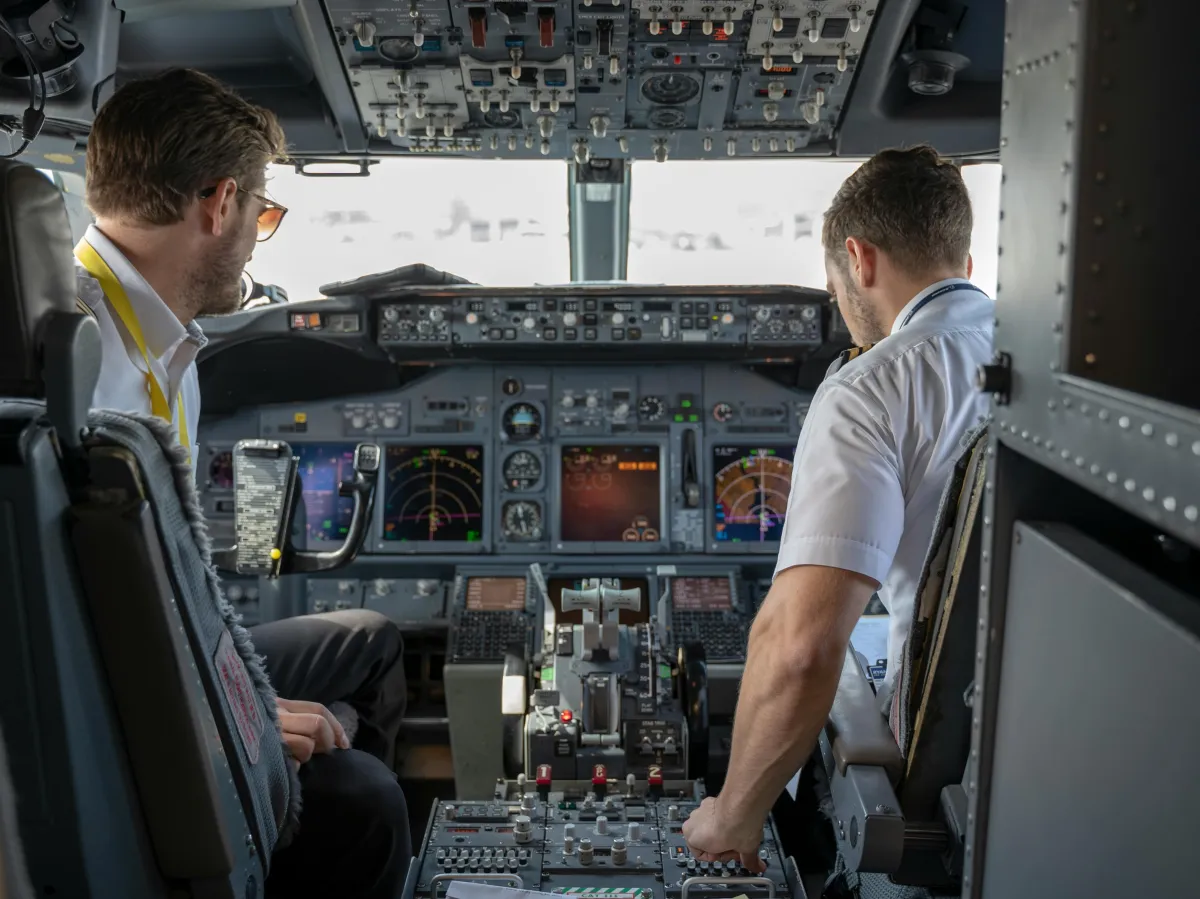Blog

How Pilot Mental Health Boosts Job Performance and Safety
How Pilot Mental Health Support Improves Job Performance and Aviation Safety
Why Investing in Mental Health Means Safer Flights and Stronger Crews
Mental health isn’t just a personal issue—it’s a public safety priority, especially in high-pressure industries like aviation. Pilots are responsible for hundreds of lives, highly technical operations, and rapid decision-making under stress. But what happens when their mental well-being begins to suffer? Without proper support, the risks are real—and the consequences can be devastating.
That’s why pilot mental health support is becoming an essential part of aviation safety culture. From confidential therapy to structured peer support programs, mental health services tailored to pilots do more than protect individual well-being—they directly improve job performance, reduce safety risks, and help create a healthier, more resilient workforce.
What Are Pilot Mental Health Programs and Their Key Components?
Pilot mental health programs are structured support systems designed to address the unique psychological and emotional demands of aviation professionals. These programs often include:
Individual therapy and counseling with aviation-informed mental health professionals
Psychiatric evaluation and medication management (in compliance with FAA or EASA rules)
Peer support networks that promote confidential conversation and early intervention
Stress and fatigue management training
Employee Assistance Programs (EAPs) offering free short-term mental health care
Substance abuse recovery programs (e.g., HIMS in the U.S.)
Educational resources for pilots and families
Confidential reporting protocols that comply with aviation medical standards
These components work together to promote mental wellness without jeopardizing medical certification or safety compliance.
Which Mental Health Services Are Tailored Specifically for Airline Pilots?
Unlike general mental health services, aviation-specific care accounts for medical and regulatory complexities. Services include:
Therapy with aviation-specialized professionals trained in the needs of aircrew
Psychiatric consultations with aviation medical examiners or flight surgeons
Treatment options for issues like performance anxiety, insomnia, chronic stress, and substance abuse
Medication management for approved SSRIs such as fluoxetine, sertraline, or escitalopram, monitored for FAA compliance
Virtual and mobile app-based options to support accessibility during irregular flight schedules
These services are designed to keep pilots mentally fit without grounding them unnecessarily.
How Do Counseling, Stress Management, and Peer Support Benefit Pilots?
Professional counseling and peer support are key to reducing long-term risk and burnout. Benefits include:
Improved stress response and emotional regulation, especially during high-pressure flights
Better sleep patterns, which combat fatigue and maintain cognitive sharpness
Support for substance use recovery, mitigating the impact of alcohol or drug misuse
Early detection of anxiety, depression, or even signs of psychosis before they escalate
Reduced stigma, thanks to anonymous peer networks and non-punitive support options
These tools help pilots cope with personal and professional challenges in a way that preserves both safety and dignity.
What Role Does Confidentiality and Accessibility Play in Pilot Mental Health Programs?
Confidentiality is non-negotiable. Pilots often fear that seeking mental health care will affect their medical certificate or job status. But programs that prioritize privacy and informed consent are more successful in helping pilots get the support they need.
FAA guidelines require disclosure only in specific cases, such as when medication or a serious diagnosis is involved
Many programs offer anonymous peer support, secure teletherapy, or confidential EAP counseling
Aviation medicine specialists help pilots navigate rules in good faith without fear of career loss
When pilots know they can seek help without losing their wings, more of them do.
How Does Mental Health Support Affect Pilot Job Performance?
Mental well-being is directly tied to focus, cognition, and judgment—skills that pilots depend on every day. Support programs lead to:
Improved decision-making in complex or high-pressure situations
Reduced distraction and intrusive thoughts during flight operations
Better resilience after emergencies or in the face of performance pressure
Higher emotional intelligence, which strengthens crew resource management and cockpit communication
Decreased absenteeism, which benefits flight schedules and staffing
Mental health is a performance enhancer—both in the cockpit and beyond.
In What Ways Does Mental Well-Being Enhance Focus and Decision-Making?
Clinical research and aviation safety data show that untreated anxiety disorders, major depressive disorder, or sleep deprivation impair:
Working memory
Situational awareness
Reaction time
Visual processing
Verbal communication
Pilots experiencing emotional stress or sleep disruption may misinterpret aircraft data, miss checklists, or struggle to coordinate with co-pilots and air traffic control.
Well-supported pilots make fewer errors and respond more effectively under pressure.
What Evidence Links Mental Health Programs to Improved Productivity?
Workplace productivity is more than just showing up—it’s about alertness, emotional control, and teamwork. Studies show:
Pilots in structured mental health programs report fewer sick days and reduced fatigue
Access to peer support correlates with higher morale and stronger team dynamics
Airlines with robust mental health resources see reduced turnover, fewer disciplinary actions, and better safety scores
Investing in mental health is a direct investment in operational stability and airline reputation.
What Is the Impact of Pilot Mental Health on Aviation Safety?
The connection between mental health and flight safety has become increasingly clear—especially in the wake of tragic events like the Germanwings Flight 9525 crash, which was linked to untreated depression.
Key safety benefits of mental health support include:
Early detection of high-risk behaviors (e.g., suicidal ideation, psychotic breaks)
Reduced risk of catastrophic error in emergency situations
Consistent emotional regulation during turbulence, aircraft malfunction, or passenger conflict
Improved fitness-for-duty assessments that account for both physical and psychological health
Organizations like the International Civil Aviation Organization (ICAO) and EASA now include mental wellness as part of holistic safety management systems (SMS).
How Do Peer Support Networks Enhance Mental Health and Safety?
Peer programs are one of the most effective tools in pilot mental health.
Trained peer volunteers listen without judgment, offering a trusted space for venting or problem-solving
Early observation of behavioral or mood changes leads to timely referrals
Reduced isolation and stigma, especially for pilots managing stress, relationship strain, or work-life imbalance
Real-world connection that complements clinical care
These networks play a critical role in fostering a culture of compassion and safety.
What Are the Long-Term Benefits of Mental Health Support for Pilots and Airlines?
For pilots:
Reduced risk of burnout, addiction, or medical disqualification
Improved family relationships and work-life balance
Career longevity and consistent flight readiness
For airlines:
Lower costs associated with absenteeism, re-training, and medical leave
Improved team dynamics and fewer HR incidents
Stronger compliance with international health and safety standards
Mental health is no longer just a pilot issue—it’s a business imperative for the entire aviation industry.
How Can Families and Education Help Support Pilot Mental Health?
Education empowers everyone involved.
Families can recognize early warning signs of depression, substance use, or burnout
Spouses and partners often provide emotional stability and encouragement to seek care
Airlines and unions can offer mental health education tools to normalize care and support resilience
Just like flight safety depends on coordination, mental health support thrives when pilots, families, and employers work together.
Conclusion: Safe Pilots Start With Healthy Minds
Supporting pilot mental health isn’t just about avoiding crisis—it’s about building a resilient, productive, and safe aviation workforce.
From counseling and medication to peer support and privacy-first policies, mental health programs are a vital layer of protection in aviation safety. They help pilots stay fit for duty, make sharper decisions in the cockpit, and lead longer, healthier careers.
Whether you’re a pilot, aviation employer, or medical examiner, investing in mental health is investing in safety, performance, and human dignity.

Stephen Rought, LCSW
Proudly Accepting
Aetna and Medicare Insurance


Disclaimer
Stephen Rought, LCSW does not guarantee any specific outcome. All content provided on the Stephen Rought, LCSW website is provided for educational or informational purposes only. Consult medical professionals you are working with about whether any opinions or recommendations provided through this website apply to you and your unique circumstances
Currently, all online therapy sessions are conducted using the HIPPA compliant Telehealth service doxy.me
SErvices
Individual Therapy
Parent Coaching
Financial Therapy
Couples Counseling
Family Therapy
